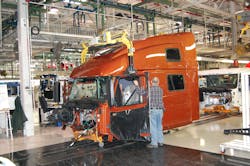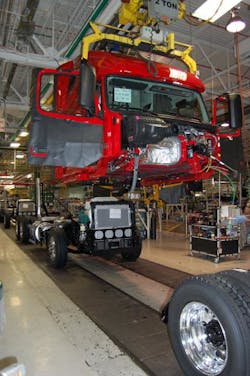For the fourth month on a row, North American Class 8 orders declined, though analysts said that doesn’t dim the overall prospects for a “robust” market for heavy commercial trucks this year.
According to ACT Research Co., North American Class 8 orders declined 25% year-over-year to 19,900 units – the lowest monthly net order volume since September 201, noted Kenny Vieth, the firm’s president and senior analyst in a statement.
However, he stressed that starting last month and for the next several months, seasonal adjustment becomes accretive to Class 8 order volumes.
“That means, seasonally adjusted, June’s order volume rises to 22,200 units – the best order month on a seasonally adjusted basis since April,” Vieth pointed out.He added that Class 5-8 orders totaled 34,600 units, down 14% from May and down 17% compared to June 2014.
“ACT Research believes the recent order decline is a reflection of meaningfully larger backlogs rather than any structural change in demand,” Vieth stressed. “Looking back one month to May, Class 5-8 backlogs were 56,000 units, or 33% above their year-ago levels.”
He noted, too, that a “large hiccup” in medium-duty orders reduced the monthly net order volume to 14,700 units, well below the 19,300 units per month net order average experienced since last July.
However, Vieth said medium-duty orders were down only 3% year-over-year, so there may be a growing seasonal consideration for softer results in June even though the “seasonal adjustment” factor is positive in June, boosting medium-duty orders to 16,000 units.
Research firm FTR Transportation Intelligence compiled similar preliminary data indicating North American Class 8 truck net orders declined to 19,624 units, again 25% below the same month last year. “Class 8 orders, while fairly predictable for the period, were somewhat above the current seasonal trend showing just a 2% month over-month-decline from May,” said Don Ake, FTR‘s VP of commercial vehicles, in a statement.
“The Class 8 market is heading into the summer order ‘bottom’ at a very normal, predictable pace,” he added. “The drop in orders is not cause for concern at all. Orders should continue to trend down in July and possibly even August.”
In Ake’s view, the Class 8 market “remains robust,” reflected in the orders received in what is typically a weak order month.
“There are few build slots available for the balance of the year due to the solid backlogs as Class 8 orders over the last six months equate to an annual rate of 305,000 units,” he explained. “Fleets right now are evaluating their 2016 requirements, and quoting activity by the OEMs has just started. Class 8 orders will remain rather subdued until the fall order season kicks in this October."
About the Author
Sean Kilcarr
Editor in Chief
Sean Kilcarr is a former longtime FleetOwner senior editor who wrote for the publication from 2000 to 2018. He served as editor-in-chief from 2017 to 2018.

